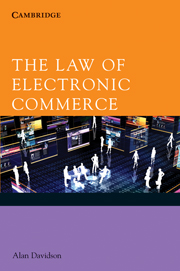Book contents
- Frontmatter
- Contents
- Acknowledgements
- Table of Cases
- Table of statutes
- 1 The law of electronic commerce
- 2 The rule of cyberspace
- 3 Electronic commerce and the law of contract
- 4 Shrinkwrap, clickwrap and browsewrap contracts
- 5 Electronic signatures
- 6 Copyright issues in electronic commerce
- 7 Electronic commerce – trade marks, patents and circuit layouts
- 8 Domain names
- 9 Domain name disputes
- 10 Uniform domain name dispute resolution policies
- 11 Jurisdiction in cyberspace
- 12 Defamation in cyberspace
- 13 Privacy and data protection in cyberspace
- 14 Electronic mail and online presence
- 15 National electronic surveillance
- 16 Cybercrime
- 17 Evidence of electronic records
- 18 Censorship – Broadcast and online content regulation
- 19 An international perspective
- Appendix A Electronic Transactions (Victoria) Act 2000
- Appendix B UNCITRAL Model Law on Electronic Commerce
- Appendix C Selected provisions Copyright Act 1968 (Cth)
- Appendix D ICANN Uniform Dispute Resolution Policy (UDRP)
- Appendix E .au Dispute Resolution Policy (auDRP)
- Appendix F National Privacy Principles
- Index
15 - National electronic surveillance
Published online by Cambridge University Press: 05 June 2012
- Frontmatter
- Contents
- Acknowledgements
- Table of Cases
- Table of statutes
- 1 The law of electronic commerce
- 2 The rule of cyberspace
- 3 Electronic commerce and the law of contract
- 4 Shrinkwrap, clickwrap and browsewrap contracts
- 5 Electronic signatures
- 6 Copyright issues in electronic commerce
- 7 Electronic commerce – trade marks, patents and circuit layouts
- 8 Domain names
- 9 Domain name disputes
- 10 Uniform domain name dispute resolution policies
- 11 Jurisdiction in cyberspace
- 12 Defamation in cyberspace
- 13 Privacy and data protection in cyberspace
- 14 Electronic mail and online presence
- 15 National electronic surveillance
- 16 Cybercrime
- 17 Evidence of electronic records
- 18 Censorship – Broadcast and online content regulation
- 19 An international perspective
- Appendix A Electronic Transactions (Victoria) Act 2000
- Appendix B UNCITRAL Model Law on Electronic Commerce
- Appendix C Selected provisions Copyright Act 1968 (Cth)
- Appendix D ICANN Uniform Dispute Resolution Policy (UDRP)
- Appendix E .au Dispute Resolution Policy (auDRP)
- Appendix F National Privacy Principles
- Index
Summary
Electronic surveillance methods have become the subject of several pieces of federal legislation since the events of September 11, 2001. Anti-terrorism legislation internationally has introduced powers and regulations which (among other things) have an impact on cyberlaw, communications, the internet and security (confidentiality and safe computer systems). The most recent proposal, the Surveillance Devices Act 2004 (Cth), includes significant increases in powers of investigation and surveillance.
Prior to September 11, 2001, there were no federal or state laws relating to terrorism. The Charter of the United Nations (Anti-Terrorism Measures) Regulations 2001 implemented aspects of UN Security Council Resolution 1373 of 28 September 2001, which called on all nation states to prevent and suppress the financing of terrorist acts. However, beginning in March 2002, the Australian government introduced a number anti-terrorism Bills. In 2003, the government announced the creation of an Ambassador for Counter-Terrorism; the government has since signed numerous memorandums of understanding on counter-terrorism.
Many of these measures affect cyberlaw and electronic commerce. The extent to which law enforcement and security agencies can now intercept, search and seize information, electronically and otherwise, has been dramatically enhanced. Some anti-terrorism provisions permit Australian law enforcement and security agencies to intercept unread emails in routine investigations. This chapter briefly examines these electronic surveillance measures.
The USA PATRIOT Act
In response to the attacks of September 11, 2001 the US Congress drafted, debated and passed the Uniting and Strengthening America by Providing Appropriate Tools Required to Intercept and Obstruct Terrorism Act 2001 (commonly known as the PATRIOT Act), all within seven weeks.
- Type
- Chapter
- Information
- The Law of Electronic Commerce , pp. 256 - 266Publisher: Cambridge University PressPrint publication year: 2009

